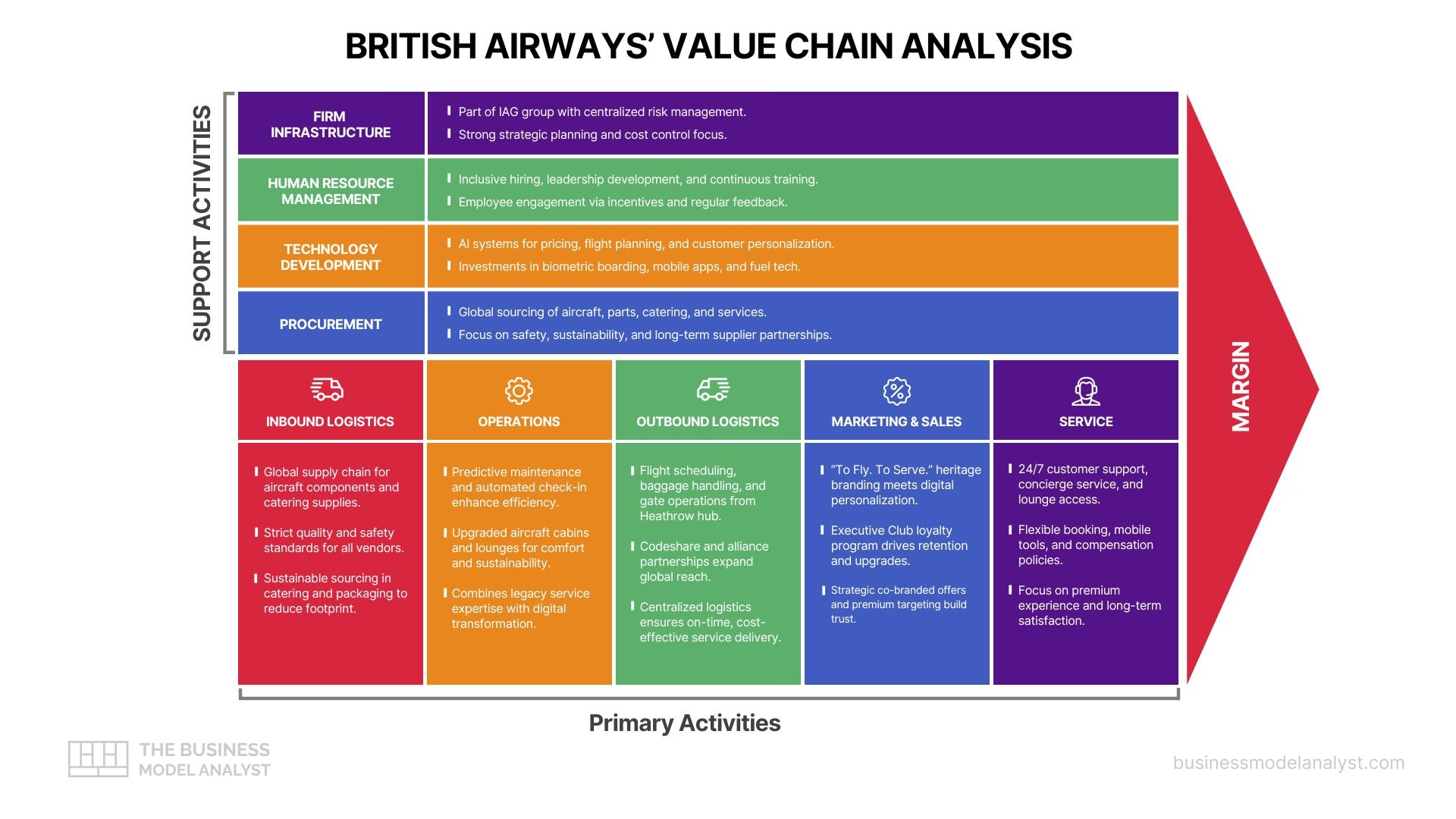AeroGenie — Ваш интеллектуальный второй пилот.
В тренде
Categories
Analysis of British Airways' Value Chain

Analysis of British Airways' Value Chain
Understanding British Airways’ sustained competitive advantage necessitates a detailed examination of its internal operations through the lens of value chain analysis. Michael Porter’s value chain framework, which categorizes business activities into primary and support functions, provides insight into how companies create value and maintain operational efficiency. For British Airways (BA), this analytical approach is pivotal in optimizing profitability, enhancing operational performance, and elevating customer satisfaction amid a challenging and dynamic aviation environment.
Overview of British Airways
Established in 1974 through the merger of BOAC and BEA, British Airways stands as the United Kingdom’s flag carrier and one of the world’s foremost full-service airlines. Headquartered in London with its principal hub at Heathrow Airport, BA serves over 180 destinations worldwide. The airline’s distinguished history includes pioneering the first supersonic passenger service with Concorde and developing strategic alliances, notably through its membership in the Oneworld Alliance. In recent years, British Airways has prioritized digital transformation initiatives aimed at improving both customer experience and operational agility. Its business model strategically balances premium and economy service offerings, supported by fleet modernization, a robust loyalty program known as the Executive Club, and a commitment to sustainable aviation practices. These elements collectively underpin BA’s global relevance and its reputation for quality service.
Primary Activities in the Value Chain
British Airways’ value chain begins with inbound logistics, where the airline manages a complex global supply network. This involves sourcing aircraft components, catering supplies, and maintenance materials exclusively from certified vendors who adhere to rigorous quality and safety standards. A notable emphasis is placed on sustainable sourcing, particularly within catering operations, where the airline has shifted towards locally sourced ingredients and environmentally friendly packaging to mitigate its ecological footprint.
Operational efficiency constitutes the core of BA’s value chain activities. The airline integrates its legacy expertise with cutting-edge innovations such as predictive maintenance technologies and automated check-in systems to streamline both ground and in-flight operations. Recent investments in upgrading aircraft cabins and airport lounges reflect BA’s dedication to enhancing passenger comfort, improving energy efficiency, and maintaining high service standards.
Outbound logistics focus on ensuring punctual and reliable passenger transport through meticulous flight scheduling, baggage handling, and gate management, primarily coordinated from its Heathrow hub. Strategic codeshare agreements and alliance partnerships extend British Airways’ logistical reach without incurring proportional increases in operational costs, a strategy that aligns with industry best practices.
In marketing and sales, British Airways combines its heritage branding with contemporary digital engagement strategies. Campaigns such as “To Fly. To Serve.” reinforce the airline’s legacy and trustworthiness, while digital platforms facilitate personalized customer interactions. The Executive Club loyalty program, alongside partnerships with credit card companies, plays a significant role in fostering customer retention and driving revenue growth.
Challenges and Market Dynamics
Despite its structured and comprehensive value chain, British Airways faces notable challenges that threaten its market position. Recent incidents, including the arrest of a flight attendant for inappropriate behavior onboard, have raised reputational concerns and risk undermining customer trust. Such events provide competitors with opportunities to highlight their own safety and service standards in efforts to attract cautious travelers. Additionally, BA’s trial of removing water bottles in economy class has elicited passenger backlash, potentially affecting customer satisfaction and brand perception.
The airline also operates within a highly competitive market environment, where consolidation efforts among Southern European carriers could alter the competitive landscape and present strategic challenges for British Airways. Successfully navigating these pressures while maintaining operational excellence and customer loyalty remains essential for the airline’s long-term sustainability.
Through a detailed value chain analysis, it becomes evident how British Airways endeavors to deliver value to its passengers, manage costs effectively, and adapt to evolving industry demands, even as it contends with reputational risks and shifting market dynamics.

Emirates Unveils Cabin Design for New Boeing 777X

Eighteen Years On, the Airbus A380 Remains Central to a $34 Billion Airline

How a boom in luxury airline seats is slowing down jet deliveries

Navitaire Outage Attributed to Planned Maintenance

Airbus Plans Record Delivery of 870 Aircraft in 2026

DigiYatra Debuts Outside Aviation at India AI Impact Summit

Vietnam Orders Strengthen Boeing’s Commercial Outlook

Airbus Signals Uncertainty Over Future A400M Orders

JobsOhio Awards $2 Million Grant to Hartzell Propeller for Innovation Center

Collins Aerospace Tests Sidekick Autonomy Software on YFQ-42A for U.S. Air Force CCA Program
